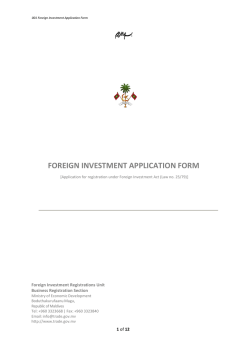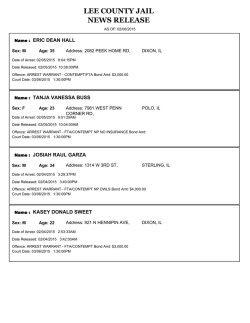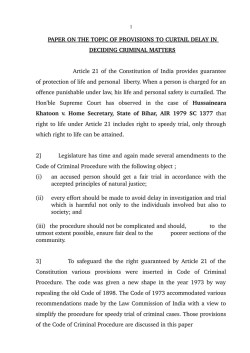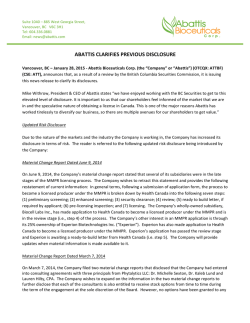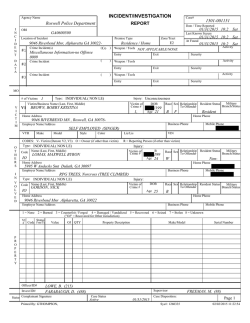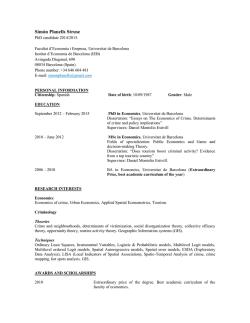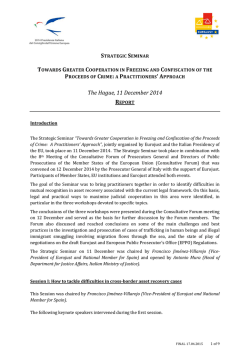
Serious Crime Bill overview
Serious Crime Bill Fact sheet: Overview of the Bill Overview 1. The Serious Crime Bill gives effect to a number of legislative proposals in the Serious and Organised Crime Strategy. In doing so, it builds on current law to ensure that the National Crime Agency, the police and other law enforcement agencies have the powers they need effectively and relentlessly to pursue, disrupt and bring to justice serious and organised criminals. In addition, the Bill includes provisions to strengthen the protection of vulnerable children and others (including from paedophiles, and from female genital mutilation). Furthermore, the Bill includes provisions to tighten prison security and to guard against the threat of terrorism posed by returning ‘foreign fighters.’ 2. The key provisions in the Bill are set out below. Part 1: Proceeds of crime 3. Part 1 of the Bill will strengthen the operation of the asset recovery process by amending the Proceeds of Crime Act 2002 (“POCA”). The key changes to POCA will: a) Increase prison sentences for failure to pay confiscation orders; b) Ensure that criminal assets cannot be hidden with spouses, associates or other third parties; c) Require courts to consider imposing an overseas travel ban for the purpose of ensuring that a confiscation order is effective; d) Enable assets to be restrained more quickly and earlier in investigations; e) Reduce the defendant’s time to pay confiscation orders; f) Extend investigative powers so that they are available to trace assets once a confiscation order is made. 4. POCA provides for similar, but separate, confiscation regimes in England and Wales, Scotland and Northern Ireland (Parts 2, 3 and 4 of POCA respectively). At the request of the Scottish Government and Department of Justice in Northern Ireland, the Bill replicates for Scotland and Northern Ireland a number of the changes being made to Part 2 of POCA in relation to England and Wales. Part 2: Computer misuse 5. The Bill makes a number of changes to the Computer Misuse Act 1990 (“the 1990 Act”), in particular to ensure that sentences for attacks on computer systems fully reflect the damage they cause. The provisions: 1 a) Create a new offence of unauthorised acts in relation to a computer that result, either directly or indirectly, in serious damage to the economy, the environment, national security or human welfare, or creates a significant risk of such damage. The offence will carry a maximum sentence of life imprisonment for cyber attacks which result in loss of life, serious illness or injury or serious damage to national security, and 14 years’ imprisonment for cyber attacks causing, or creating a significant risk of, severe economic or environmental damage or social disruption. b) Extend section 3A (making, supplying, or obtaining articles for use in offences under sections 1 or 3) of the 1990 Act to include an offence of ‘obtain for use’ to cover the event of tools being obtained for personal use to commit offences under section 1 (unauthorised access to computer material), section 3 (unauthorised acts with intent to impair, or with recklessness as to impairing operation of a computer etc), or the new offence above. c) Extend the existing extra territorial jurisdiction provisions in section 4 of the 1990 Act to provide a legal basis to prosecute a UK national who commits any 1990 Act offence whilst physically outside the UK, where the offence has no link to the UK other than the offender’s nationality (provided the offence is also an offence in the country where it took place). Part 3: Organised, serious and gang-related crime 6. Part 3 of the Bill will enhance the ability of law enforcement agencies to prosecute those responsible for serious and organised crime. In particular, it will create a new offence of participation in an organised crime group. This offence will rely on proving the active relationship with the organised criminality, so the individual will have to have done something to take part in the crime (deliver packages, rent warehouse space, written a contract). The offence will have a maximum penalty of 5 years’ imprisonment. 7. This Part also makes a number of changes to the law governing Serious Crime Prevention Orders (“SCPOs”) and gang injunctions to strengthen their effectiveness in preventing people in engaging in serious and organised crime. The measures in the Bill will: a) Add offences relating to firearms possession, cyber crime, and the cultivation of cannabis plants to the list of ‘trigger’ offences for imposing an SCPO; b) Enable the Crown Court to impose a new SCPO where the subject of an existing SCPO is convicted of breach of that order. If a person has been charged with a serious offence or breach offence while subject to an SCPO, the Crown Court will also be able to keep his or her order in place (beyond the existing five year limit) until the criminal proceedings have been concluded; c) Extend SCPOs to Scotland (at the request of the Scottish Government); d) Consolidate the Financial Reporting Order into the SCPO; e) Expand the range of activities in respect of which a gang injunction may be granted to include any involvement in support of the illegal drugs market. 2 Part 4: Seizure and forfeiture of drug-cutting agents 8. Certain chemical substances, which in their raw form have limited uses in the legitimate manufacture of medicinal products, can also be used as cutting agents for bulking illegal drugs (predominantly cocaine), thereby maximising criminal profit margins. Part 4 of the Bill introduces new powers to enable law enforcement agencies to enter and search premises for drug-cutting agents, and to seize and detain any chemical substance that is reasonably suspected of being intended for use for such purposes. The relevant agency would then be able to make an application to a magistrates’ court for detention and subsequent forfeiture of the seized cutting agents. The court must grant a forfeiture order where it concludes that the substances were intended for use as a cutting agent. Part 5: Protection of children and others 9. Part 5 makes a number of changes to the civil and criminal law to enhance the protection of children and others, namely: a) Updating and clarifying the offence of child cruelty in section 1 of the Children and Young Persons Act 1933, in particular, to make it explicit that the offence covers conduct which is likely to cause psychological suffering or injury as well as physical harm. This Part also modernises some of the language in section 1 of the 1933 Act; b) Introducing a new offence of sexual communication with a child. This would criminalise an adult who communicates with a child for the purpose of obtaining sexual gratification, where the communication is sexual or if it is intended to elicit from the child a communication which is sexual; c) Creating a new offence making it illegal to possess paedophile manuals; that is, any item that contains advice or guidance about abusing children sexually. The offence will be subject to a three year maximum prison sentence; d) New provisions on tackling FGM by: Extending the extra-territorial reach of the offences in the Female Genital Mutilation Act 2003 (and Prevention of Female Genital Mutilation (Scotland) Act 2005) so that they apply to habitual as well as permanent UK residents; introducing a new offence of failing to protect a girl from risk of FGM; granting lifelong anonymity to victims; and bringing in a civil order (“FGM protection orders”) to protect potential victims; e) Tackling domestic abuse by criminalising patterns of repeated or continuous coercive or controlling behaviour where perpetrated against an intimate partner or family member, causing victims to feel fear, alarm or distress. Part 6: Miscellaneous and general 10. Part 6 makes a number of miscellaneous changes, namely: a) Creating a new offence of unauthorised possession of a knife or other offensive weapon in prison. The offence would carry a maximum sentence of four years’ imprisonment, in line with the equivalent offence in the community; 3 b) Enabling regulations to be made to confer on relevant courts the power to compel Mobile Network Operators to disconnect mobile phone handsets and SIM cards found to be operating in prison without authorisation; c) Amending section 17 of the Terrorism Act 2006 so as to confer extra-territorial jurisdiction on the UK courts for the offence in section 5 (preparation of terrorist acts) of the Act, and to extend the limited extra-territorial jurisdiction that currently applies to the offence in section 6 (training for terrorism) of the Act; d) Conferring Parliamentary authorisation for the Government to support two draft Council Decisions in Brussels, the legal basis for which is Article 352 of the Treaty on the Functioning of the European Union. Section 8 of the European Union Act 2011 sets out that a Minister of the Crown may not support an Article 352 decision unless the draft decision is approved by an Act of Parliament. The first draft Council Decision relates to Pericles – a programme for exchange, assistance and training in the protection of the Euro against counterfeiting. The UK benefits directly from training and information exchange under this programme. The second draft Decision relates to the repeal of a now completed programme to support Member States’ efforts to prevent, prepare for, and to protect people and critical infrastructure against risks linked to terrorist attacks and other security related risks. 11. For more information on the Bill and to view supporting documentation, including detailed fact sheets on the provisions, please see the Bill web page on the Government website: https://www.gov.uk/government/collections/serious-crime-bill Home Office January 2015 4
© Copyright 2026
